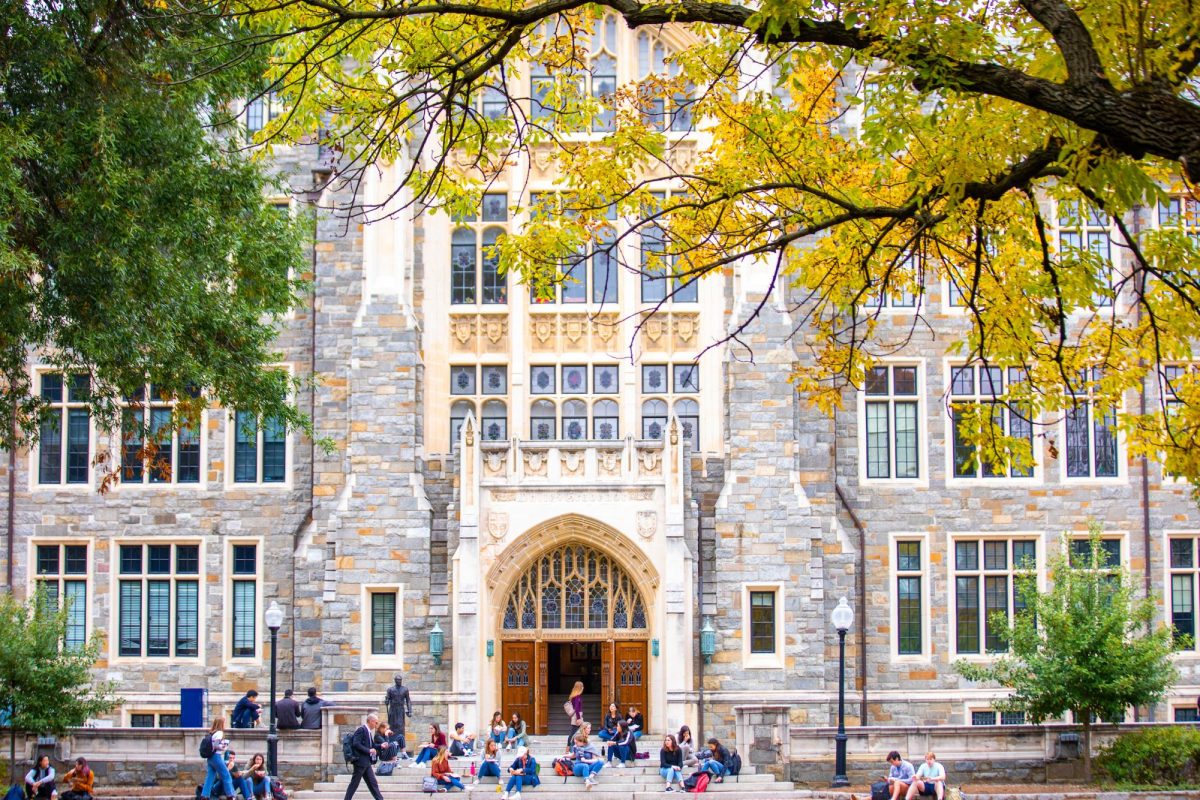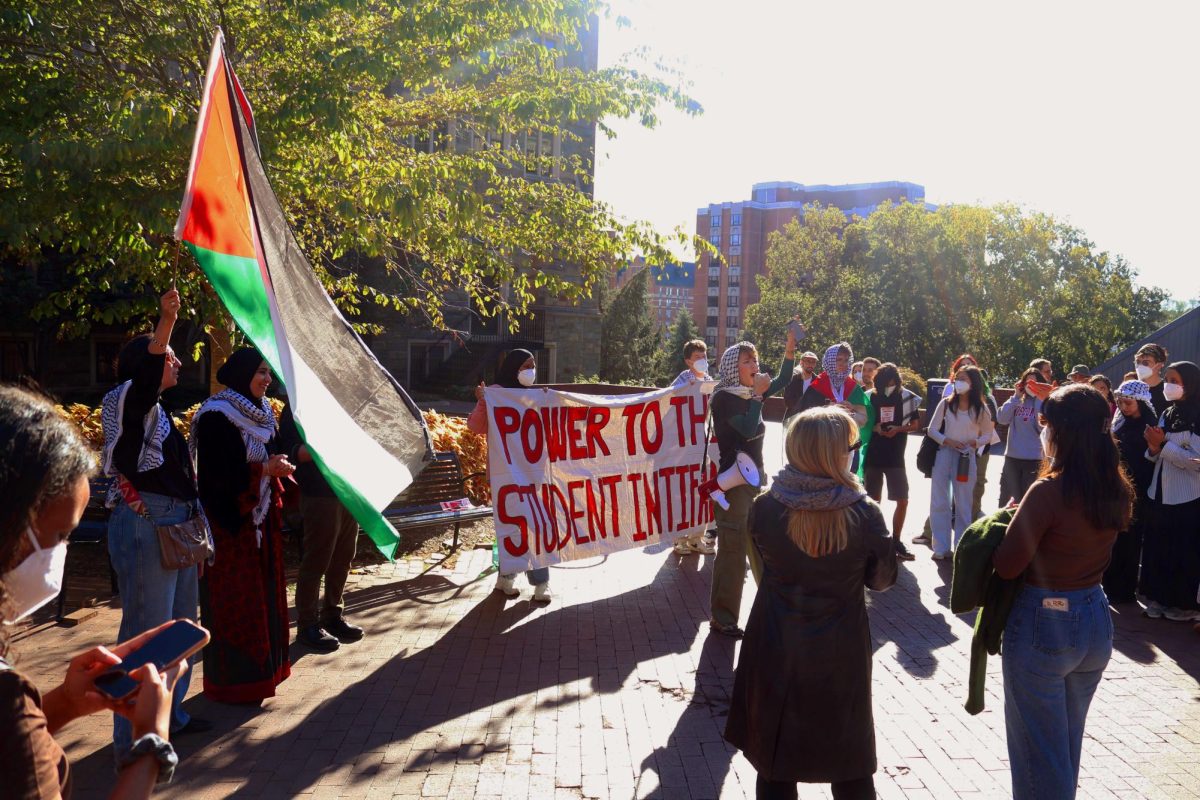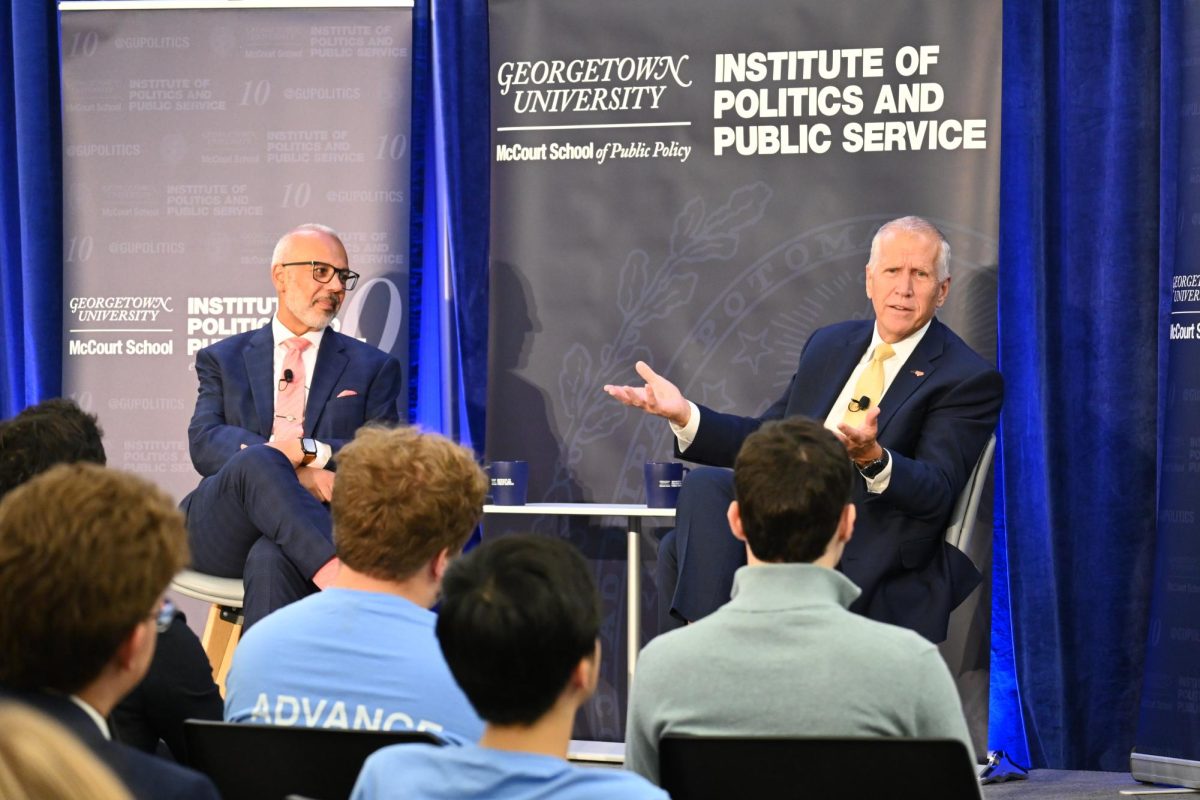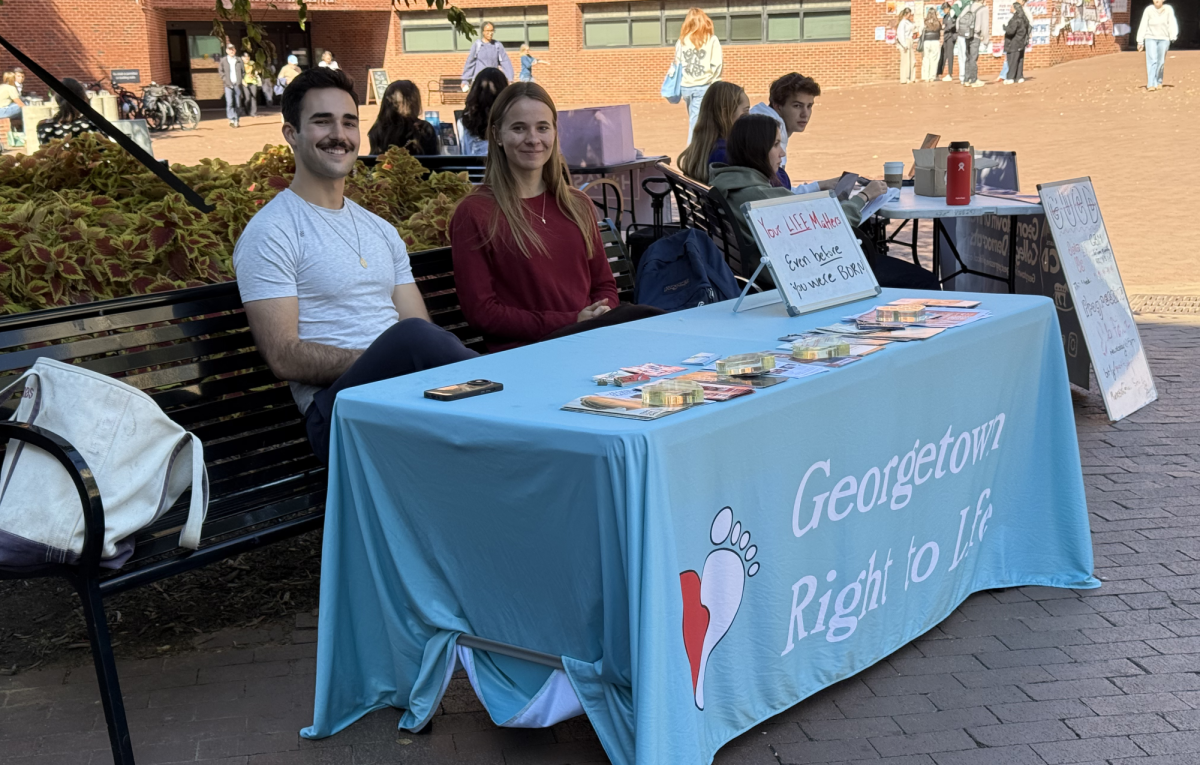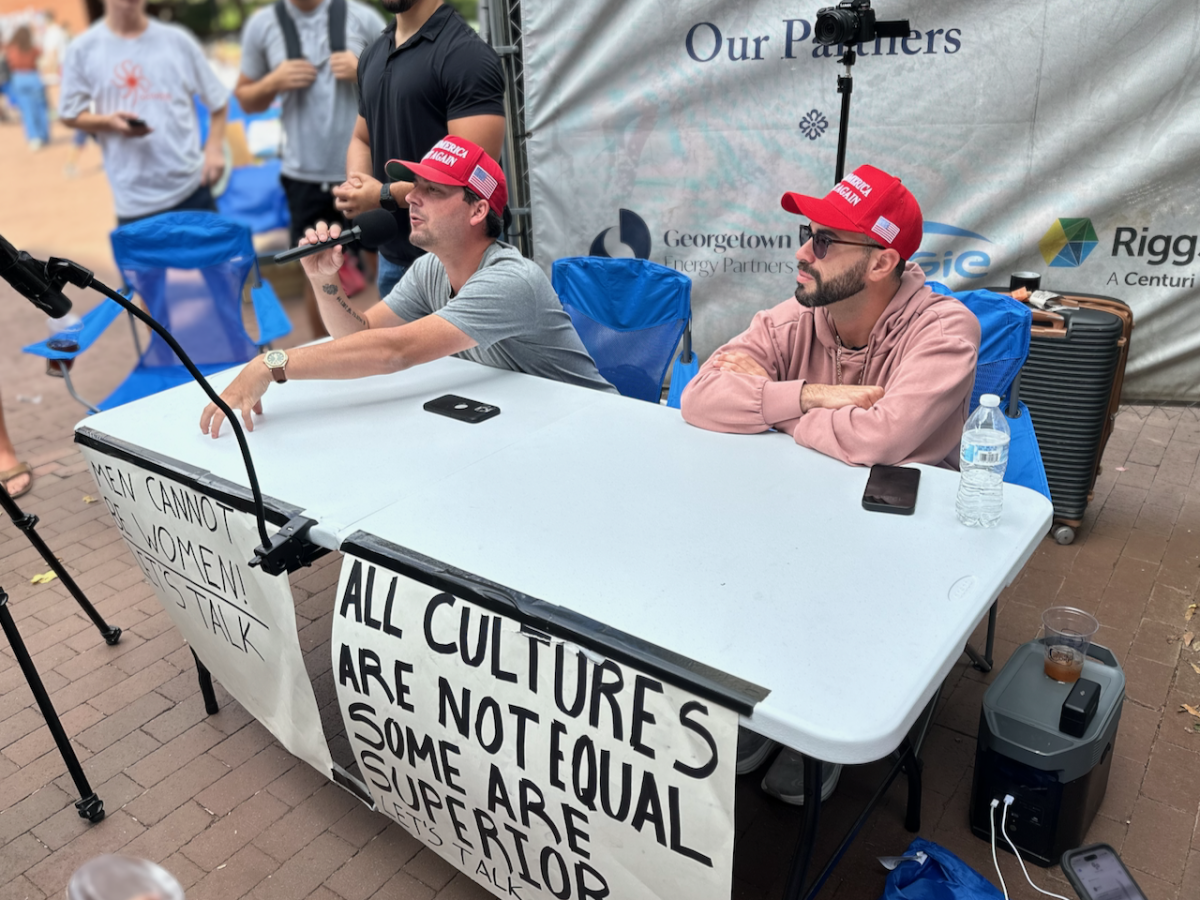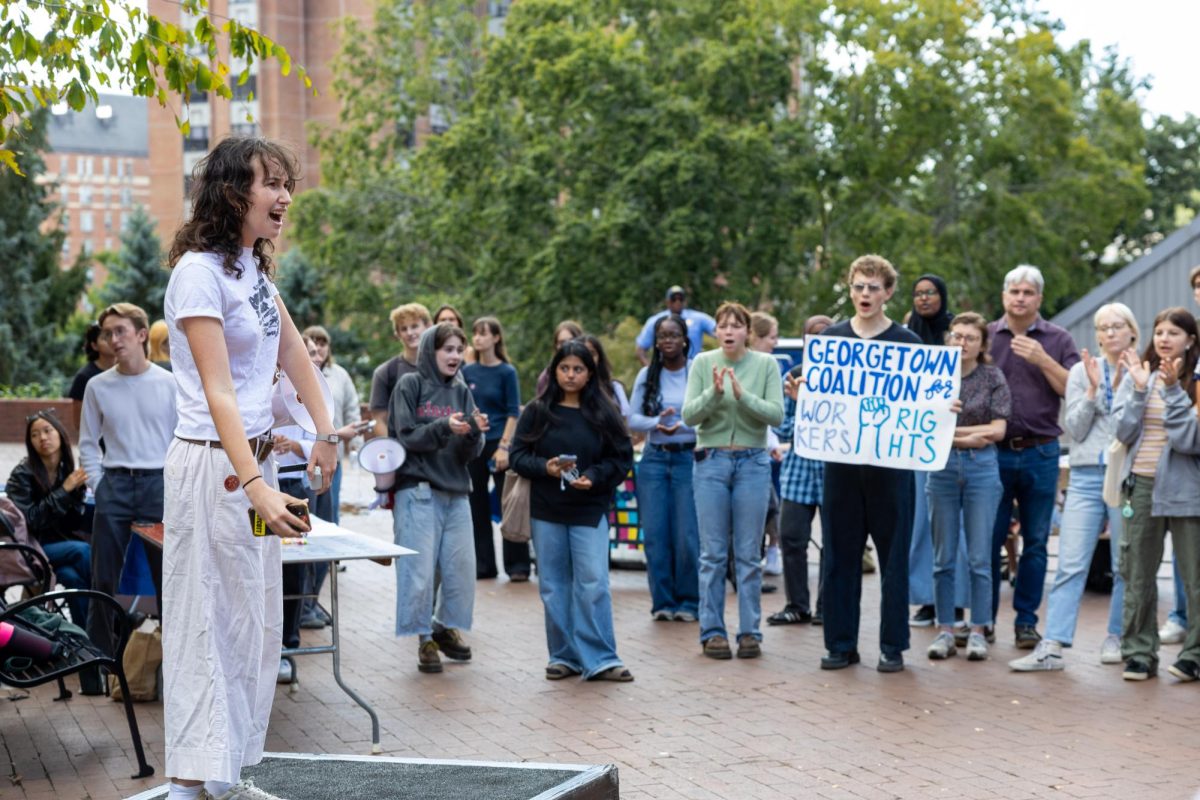More than 150 pro-Palestinian protestors marched across Georgetown University’s campus Sept. 4 in a rally to protest perceived university censorship of Students for Justice in Palestine (SJP), a student organization that supports Palestinian liberation.
SJP announced the rally after the Center for Student Engagement (CSE), the university center that liaises with all university-sponsored organizations, reminded organizations of the enforcement of a policy that requires student organizations to pay for Georgetown University Police Department (GUPD) security at events when the university deems it necessary.
According to a Sept. 1 post on SJP’s Instagram account, the group also received notice Aug. 27 from the Office of Student Conduct that it was in violation of the Code of Student Conduct, charged with disruption of official university functions — actions that disrupt or obstruct official functions such as teaching and proceedings — and violation of university policies and regulations.
The Sept. 4 rally began in Red Square, before protesters marched past the Intercultural Center, Reiss Science Building, Regents Hall and Harbin Hall and held another rally in front of Leo J. O’Donovan Dining Hall, blocking the intersection of Library Walk and Tondorf Road. Protesters ended the march in front of Healy Hall.
An organizer serving as a media liaison for SJP said the group held the rally to protest the enforcement of the paid security policy and the student conduct charges.
“We’re having the rally today mostly just because Georgetown has, as of very recently, as of the very first day of school, been trying to repress Palestinian voices on campus, specifically SJP, as it pertains to advocating for the end to the genocide in Gaza,” the organizer told The Hoya on behalf of SJP.
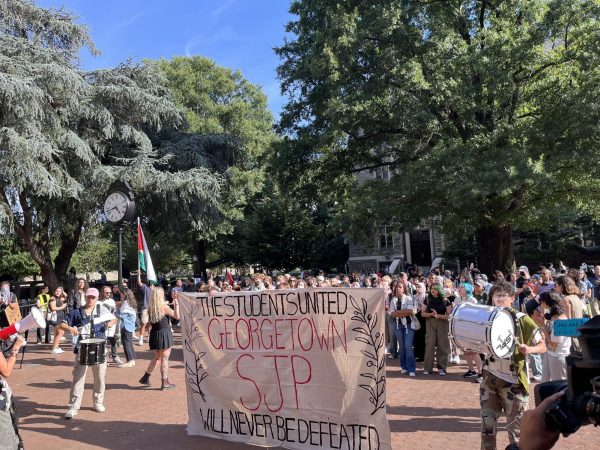
In its Oct. 7 attack in southern Israel, Hamas killed over 1,100 Israelis and took over 250 hostages, 111 of whom have not been released; Israel’s military response has killed over 40,000 people and has left over 92,000 people injured, displacing over 85% of Gazans. Civilians who live in the Gaza Strip experience a severe shortage of food, water, shelter and access to hospitals.
Besides the policy and student conduct charges, SJP is calling for the university to divest from companies with ties to the Israeli military.
“The biggest thing that we want from the administration is to stop supporting corporations that fund the apartheid that is committing a multitude of human rights abuses against the Palestinian people,” the organizer said on behalf of SJP. “Our second one, also, is just to be able to grant us the ability to speak freely on campus and to advocate for the human rights of Palestinians.”
Since Aug. 26, the CSE has conducted Blueprint trainings, which explain university policies to leaders of university-recognized student organizations, including SJP, and provided a “Blueprint Manual” as a resource for student groups to better understand university policies. The 2024-25 Blueprint Manual references protests relating to Israel, Gaza and Palestine as an example question relating to GUPD event security.
According to the Sept. 1 Instagram post and the SJP media liaison, a CSE staff member also referenced an SJP protest in February in another example during a Blueprint presentation.
“Certain policies within the Blueprint training were, quite frankly, discriminatory against Palestinians and were ways of implicitly trying to suppress Palestinian advocacy on campus,” the SJP organizer said on behalf of the organization.
The university’s free speech policy also requires student groups to cover the cost of GUPD security when the university administration deems it necessary to ensure security. According to the Blueprint Manual, GUPD is responsible for determining the number of officers needed at an event, with each officer’s shift costing student groups $65.65 per hour.
A university spokesperson said that this rule exists to safely uphold the Speech and Expression Policy for all student organizations, rather than overburden certain groups with expenses.
“All student groups (and academic units) have for many years been responsible for covering the costs of any events that they host,” the university spokesperson wrote to The Hoya. “While event organizers are responsible for the cost of security, our published guidelines are clear that no one will be prevented from hosting an event due to the cost of security. There are no differences in how we implement our policy based on the viewpoint of the event.”
Members of Georgetown’s chapter of Jewish Voice for Peace (JVP), a student group of anti-Zionist Jewish students, and the DMV SJP Coalition, a group of college SJP chapters from the Washington, D.C.-Maryland-Virginia area, joined the march and spoke at the rally.
An organizer representing JVP said the group’s members protested out of fear that the university would subjectively enforce CSE policies, such as paying for GUPD security.
“These sorts of policies are often enforced on a case-by-case basis, which introduces the possibility of discriminatory enforcement,” the organizer told The Hoya on behalf of JVP. “It introduces the possibility that even within pro-Palestine student organizing, a group like SJP, a group that is more outwardly Palestinian- and Arab-led, that there might be more enforcement towards them than there might be for an organization like JVP.”
During the protest, attendees chanted, “Who’s angry at the whole administration right now? Free, free Palestine. We will not be pushed aside. Stop funding genocide.”
Matt Buscarino (CAS ’27), who heard the protest from his dorm and observed the rally in front of Leo’s, said he was sympathetic with the protest but disagreed with certain phrases protestors chanted, such as “intifada,” an Arabic word for rebellion, often referring to Palestinian uprisings and resulting violence from 1987 to 1993 and 2000 to 2005.
“I am sympathetic to the cause, one hundred percent,” Buscarino told The Hoya. “I have frustrations about a lot of the messaging. I think it’s a turn-off for a lot of people. I know that there’s a lot of things that I don’t agree with, like calls for violence and ‘intifada revolution.’”
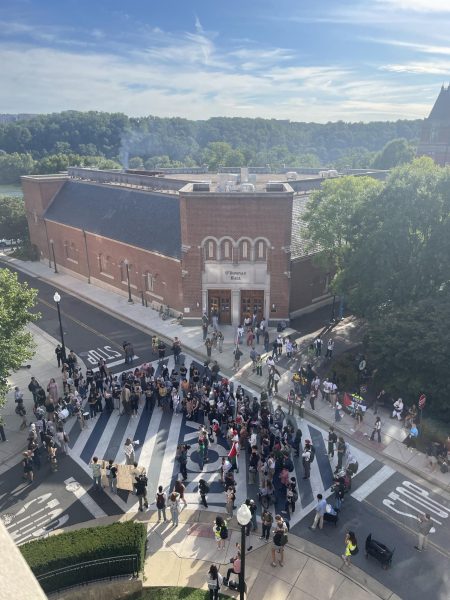
Ryan Connelly (CAS ’27), who also watched the rally in front of Leo’s, said he believed humanitarian arguments would better persuade Georgetown University President John J. DeGioia (CAS ’79, GRD ’95) to divest than calls for intifada.
“The issue is if they came here and they were talking about what’s happening in Rafah, talking about food shortages in northern Gaza, and saying, ‘We need to divest from this,’ I think that would be a lot more persuasive to the people like DeGioia than walking around and calling for the destruction of the State of Israel,” Connelly told The Hoya.
Buscarino said he thought the protest moving across campus and gaining students’ attention would help the protestors achieve their objectives.
“I think that for any good protest, you have to make people uncomfortable, and the fact that there are a lot of people frustrated by the noise, frustrated by the inconvenience, that’s a good thing, because the point of a protest is to be out there, to be a nuisance, so that people are forced to acknowledge your presence,” Buscarino said.
The SJP organizer said the group is dedicated to bringing attention to the humanitarian crisis and high death toll that the conflict has caused.
“I think that it really does speak volumes that within the first week of school, SJP is back and stronger than ever,” the organizer said on behalf of SJP. “I think that we’ve re-energized this summer and we want to make sure that people don’t forget that the people of Palestine are experiencing a genocide.”
“We will be here and we will continue to be speaking despite the fact that there have been these obstacles that they’re trying to put in front of us,” the organizer added.


